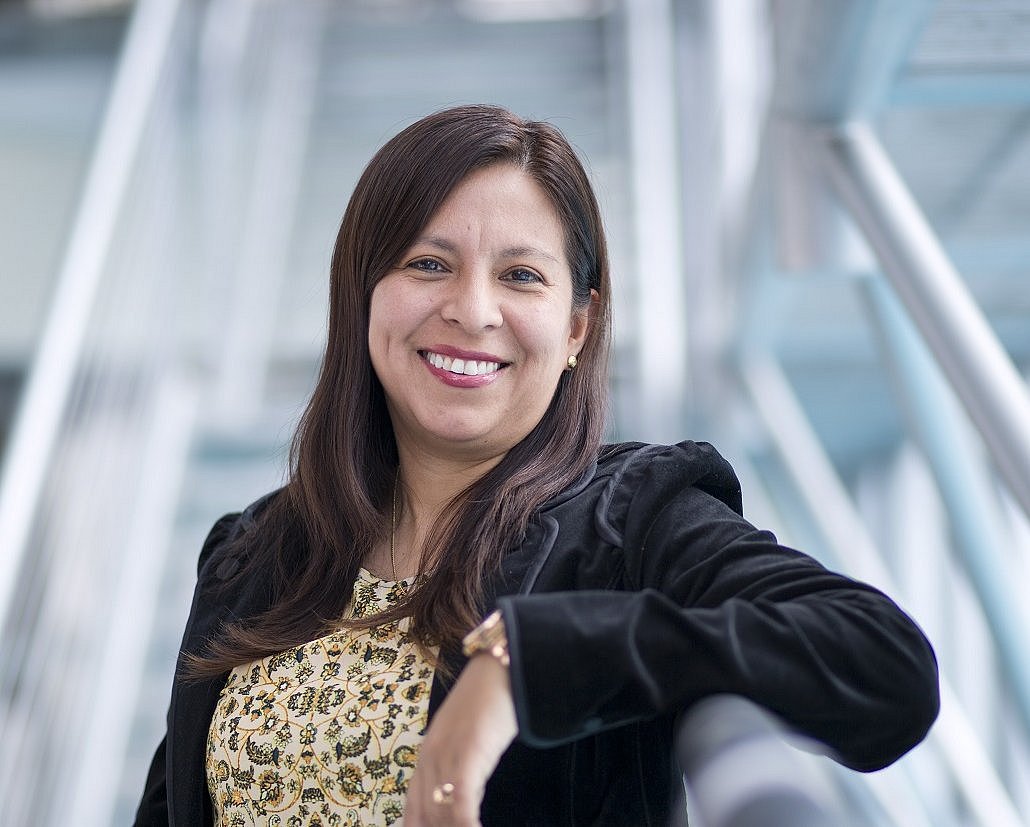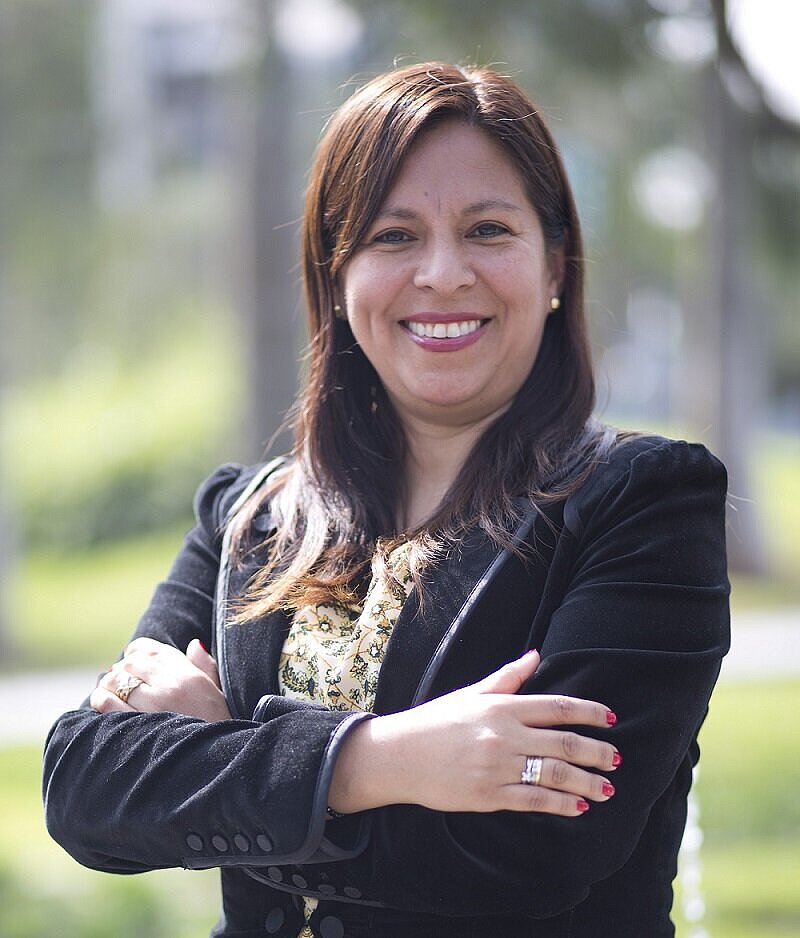The priority in Peru is different because there are different realities
News

Julianna Paola Ramírez Lozano is a full-time professor at the Graduate Business Department of the Pontificia Universidad Católica del Perú (PUCP), Lima, Peru. From September to the end of October 2022 she visited Business School Pforzheim as a guest professor and taught courses on organization, communication and advertising in our study program Master Corporate Communication Management. In the interview with our student Sophie Mercedes Familia Ms. Ramirez talks about her research on different topics, her honorary program and the difference between Peru and Germany.
Ms. Ramirez, you spent six weeks as a guest professor at our Business School. How did you get to know our Business School Pforzheim?
I got to know this university through Consejo Latinoamericano de Escuelas de Negocios, CLADEA. CLADEA is an institution that groups business schools from Latin America and has agreements with many universities in Europe and one of them is Pforzheim University. I decided to go to Pforzheim because I found it interesting to come here for the master's degree in communication and management.
You are a full-time professor at the Graduate Business Department of the Pontificia Universidad Católica del Perú and researcher, professor and "Head of Sustainability" at the Business Center, CENTRUM-PUCP, the business school of the Pontificia Universidad Católica del Perú. What do you do in your research?
I am a career counselor and throughout the years I have worked on topics related to business and companies, specifically social responsibility in business and companies. So now my research focuses on ethics, social responsibility and corporate communication. I also deal with the topic of social responsibility of universities. With the model that we have developed, we have programs and projects of social responsibility.
You have created some free study programs in Peru, in which you and many other honorary professors teach start-ups, micro-entrepreneurs or women entrepreneurs. You also received the AMBA award for these programs, one of the three accreditations next to AACSB and EFMD/EQUIS. How did this project come about?
The programs are based on the model of social responsibility of a business school. The raison d'être of a business school is to teach and train its students in the business world. So we have recognized that an important area is to be able to offer education and business training to people who have never accessed a university but who have a business, who have learned from practice, but who do not have academic knowledge. So our responsibility as a business school is to be able to give these tools to these micro-entrepreneurs and businessmen that exist in Peru. We do this thanks to our teachers, who teach these classes on an honorary basis, and it began just as the pandemic also began in the year 2020.
Does this program help you acquire new ideas and knowledge that you can then apply to your regular courses and classes and to your research?
Of course. I wrote an article that talks about the model of voluntary social responsibility for business schools. And through that the idea of this practical experience was born. The first project we took out and produced at Centro de Negocios PUCP was "Mejorando Mi Bodega". At that time, "Mejorando Mi Bodega" was a training program for my entrepreneurs - bodegueros (small businesses) - and we did other programs that followed the same model in the sense that business training has an ally in the form of companies that contribute as sponsors to finance the project. And in the end it's a wonderful alliance because we all win: the entrepreneurs win, we all win, the university wins, the teachers win. Because in this way they can also demonstrate their social responsibility. Today we have six programs along the same lines, for example, with women or in the context of tourism.
Do you think people in Peru are concerned about the same sustainability issues as people in Germany?
The situation is different. We still have to overcome the basic needs of the pyramid at the first level, for example, the end of poverty. Europe is already at the second level. You have new ways of innovation or sustainable cities. But in Peru we have to deal with health, education and overcoming poverty in general, so there are still many differences. I think that education, as in my project, is the most basic because there are people who never went to university. So we cannot start with bigger things if basic things are missing. The priority is different because there are different realities.
What especially surprised you in Germany? What will you remember most about your weeks in Germany?
That's a nice question. I had a lot of expectations regarding the cultural issue, for example, I expected the Germans to be much more distant but I found a great closeness with the whole team and the different teachers who are all wonderful. And the students as well. So I think I like the good memories of closeness, the institute, talking about our subjects, sharing them together and research. And I love the internationality! I have seen a lot of movements and activities - parties, the celebration of the new EFMD-accreditation, a lot of life at the university. I love it because maybe in other universities elsewhere I would not have seen these movements and activities.
Would you like to come back?
Of course! I would love to come back. The topics interest me a lot and the research gives more value to communication and business management. I think it is a great credo.
Thank you for your time and have a nice trip to Peru!
The Pontifical Catholic University of Peru (PUCP) was founded in 1917 and is recognized for its plurality, the quality of its teaching, research, social responsibility, support for culture and its inspiring action . The oldest private university in the country has approximately 25,000 students in 13 different faculties.
La prioridad en Perú es diferente porque hay realidades diferentes
Julianna Paola Ramírez Lozano es profesora de Tiempo Completo del Departamento Académico de Posgrado en Negocios de la Pontificia Universidad Católica del Perú (PUCP), Lima, Perú. De septiembre a finales de octubre 2022 visitó la Business School Pforzheim como profesora visitante y impartió cursos sobre organización, comunicación y publicidad en el máster Corporate Communication Management. En la entrevista con nuestra estudiante Sophie Mercedes Familia, nos habla de sus investigaciones sobre temas diferentes, su programa honorario y la diferencia entre Perú e Alemania.
Señora Ramírez, usted pasó seis semanas como profesora visitante en nuestra Business School. ¿Cómo conoció de nuestra Business School Pforzheim?
Conocí esta universidad a través del Consejo Latinoamericano de Escuelas de Negocios, CLADEA. CLADEA es una institución que agrupa a escuelas de negocios de América Latina y que tiene acuerdos con muchas universidades de Europa y una de esas es la universidad Pforzheim. Me decidió para Pforzheim porque me parece interesante venir aquí por la maestría en comunicación y gestión.
Usted es profesora de Tiempo Completo del Departamento Académico de Posgrado en Negocios de la Pontificia Universidad Católica del Perú e investigadora, profesora y „Jefa de Sostenibilidad” en el Centro de Negocios, el CENTRUM-PUCP, la escuela de negocios de la Universidad Pontificia Católica del Perú, ¿de qué se ocupa en sus investigaciones?
Soy comunicadora de carrera y a lo largo de los años he trabajado en temas relacionados con los negocios y las empresas, en concreto con la responsabilidad social en los negocios y empresas. Así que ahora mi investigación se centra en la ética, la responsabilidad social y la comunicación corporativa. Asimismo, me ocupo también con el tema de la responsabilidad social universitaria que es la responsabilidad social de las universidades. Con el modelo que hemos desarrollado, tenemos programas y proyectos de la responsabilidad social.
Usted ha creado algunos programas de estudios gratuitos en Perú, en el que usted y muchos otros profesores honorarios instruyen a empresas emergentes, microempresarios o mujeres empresarias. También recibió el premio AMBA por esos programas, una de las tres acreditaciones al lado de AACSB e EFMD/EQUIS. ¿Cómo surgió este proyecto?
Los programas surgen a partir del modelo de la responsabilidad social universitaria de una escuela de negocios. La razón de ser de una escuela de negocios es enseñar y formar a sus alumnos en el mundo de la empresa. Así que hemos reconocidos que un área importante es poder ofrecer educación, formación de negocios a personas que nunca han accedido una universidad pero que tienen negocios, que han aprendido de la práctica, pero que no tienen información universitaria. Entonces nuestra responsabilidad como escuela de negocios es poder darles esas herramientas a estos microemprendedores y negociantes que existen en Perú. Lo hacemos gracias a nuestros docentes, que de manera honoraria dictan estas clases y se comenzó justo como comenzó la pandemia también en el año 2020.
¿Le ayuda este programa a adquirir nuevas ideas y conocimientos que pueda después aplicar a sus cursos y clases normales y a su investigación?
Por supuesto. Escribí un artículo que habla sobre el modelo de la responsabilidad social voluntaria para las escuelas de negocios. Y justamente nació esta experiencia práctica. El primer proyecto que sacamos y producimos en Centro de Negocios PUCP fue “Mejorando Mi Bodega”. Luego fue de “Mejorando Mi Bodega” un programa de formación para mis empresarios - bodegueros (pequeños negocios) - e hicimos otros programas que seguían el mismo modelo en el sentido de que la formación empresarial tiene un aliado en forma de empresas que contribuyen como patrocinadores a financiar el proyecto. Y al final es una alianza maravillosa porque al final ganamos todos: ganan espesores, ganan los empresarios, gana la universidad, los docentes. Porque así también pueden demostrar su responsabilidad social. Hoy tenemos seis programas que van en la misma línea, por ejemplo, con mujeres o en el contexto del turismo.
¿Cree usted que a la gente de Perú le preocupan los mismos temas de sostenibilidad que a la gente en Alemania?
La situación es diferente. Nosotros todavía tenemos que superar las necesidades básicas de la pirámide en el primero nivel, por ejemplo, el fin de la pobreza. Europa ya está en el segundo nivel. Vosotros todavía tenéis nuevas maneras de innovación o ciudades sostenibles. Pero en Perú nosotros tenemos que ocuparnos de la salud, la educación y la superación de la pobreza en general, entonces hay muchas diferencias todavía. Creo que la educación, como en mi proyecto, es lo más básico porque hay personas que nunca estaban a la universidad. Entonces no podemos empezar con cosas más grandes si faltan cosas básicas. La prioridad es diferente porque hay realidades diferentes.
¿Qué le ha sorprendido especialmente en Alemania? ¿Qué es lo que más recordará de sus semanas en Alemania?
Es una bonita pregunta. Tenía muchas expectativas en relación con el tema cultural, por ejemplo, esperaba que los alemanes fueran mucho más distantes pero encontré una gran cercanía con todo el equipo y los profesores diferentes que son todos maravillosos. Y los alumnos también. Entonces creo que me gustan los buenos recuerdos de cercanía, el instituto, hablar de nuestros temas, compartirlos juntos e investigaciones. ¡Y me encanta la internacionalidad! He visto muchos movimientos y actividades – fiestas, la celebración de la nueva EFMD-acreditación, mucha vida en la universidad. Me encanta porque quizás en otras universidades en otras partes no habría visto estos movimientos y actividades.
¿Desearía volver?
¡Por supuesto! Me encantaría volver. Los temas me interesan mucho y las investigaciones dan más valor a la gestión de la comunicación y de las empresas. Creo que es un gran credo.
¡Gracias por su tiempo y que tenga un buen viaje a Perú!
La Pontificia Universidad Católica del Perú (PUCP) fue fundado en el año 1917 y es reconocida por su pluralidad, la calidad de su enseñanza, investigaciones, responsabilidad social, apoyo a la cultura y su acción inspiradora. La universidad privada más antigua del país tiene aproximado 25 000 estudiantes repartidos en 13 facultades diferentes.



